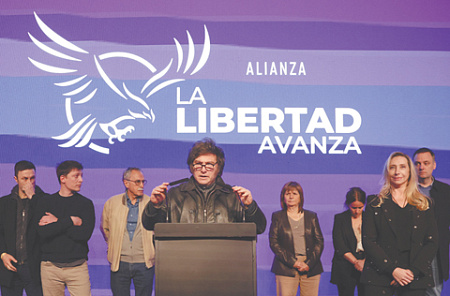
In a significant policy reversal, Argentinian President Javier Milei has reinstated the country’s Ministry of the Interior, a department he had previously downgraded in his radical bid to shrink the state. This move, effective September 11, follows a crushing electoral defeat for his party and is seen by the opposition as a clear sign that the libertarian leader’s ‘chainsaw’ reforms are beginning to falter.
Shortly after taking office, the self-proclaimed ‘anarcho-capitalist’ slashed the number of government ministries from 18 to just nine, demoting the Interior Ministry to a secretariat. In Argentina, this ministry is not primarily for law enforcement but is the crucial body for managing relations between the federal government and the provinces. Its demotion was a cornerstone of Milei’s campaign promise to ‘cut’ the bureaucratic apparatus, a pledge he famously symbolized by brandishing a chainsaw at rallies.
The decision to restore the ministry’s status is a direct reaction to a stunning loss for Milei’s ‘La Libertad Avanza’ (Liberty Advances) party in the September 7th legislative elections in Buenos Aires province. The party secured only 34% of the vote, losing to the left-wing Peronist coalition ‘Unión por la Patria’ (Union for the Homeland). With nearly 40% of the nation’s voters, the province is a critical bellwether for the upcoming national parliamentary elections on October 26, a contest Milei himself had framed as a ‘life-or-death battle’ against the opposition.
While the move appears to be a concession, Milei immediately sent a conflicting signal. He vetoed an opposition-backed bill to increase funding for the country’s cash-strapped public universities, suggesting his retreat from radicalism may be more strategic than sincere. This has left observers questioning whether the president, facing falling approval ratings, is genuinely changing course or merely making a tactical maneuver to survive the upcoming elections.
Milei’s ‘shock therapy’ has had mixed results. While it has successfully tamed rampant inflation, bringing the monthly rate down from a staggering 25% to 1.9%, it has come at a high social cost. Rising unemployment and deep cuts to social subsidies, a staple of previous Peronist governments, have hit the population hard. This growing discontent threatens Milei’s chances in the October elections, where he desperately needs to strengthen his minority position in parliament.
The president’s challenges are compounded by a corruption scandal involving his sister and chief of staff, Karina Milei, who is under investigation for the alleged misuse of public funds. However, experts caution against writing Milei off. While the defeat in Buenos Aires province was significant, Milei’s allies recently won in the capital city, highlighting a complex political landscape. According to analysts, the federal structure of Argentina means provincial governors hold immense power and will be key players in the election.
The future of Milei’s presidency may hinge on his ability to negotiate with these powerful governors, a relationship he has imperiled by vetoing provincial funding legislation. Simultaneously, the Peronist opposition appears to be consolidating around Axel Kicillof, the influential governor of Buenos Aires province, presenting a newly energized challenge. With numerous variables at play, the October 26th elections are shaping up to be a decisive—and highly unpredictable—referendum on one of the world’s most audacious libertarian experiments.
